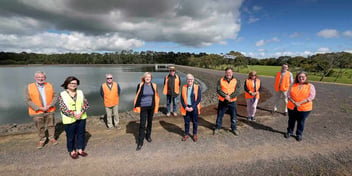Barwon Water producing green energy from reclamation plant
Barwon Water has switched on the generator at its Colac water reclamation plant, which is now producing 5.5 gigawatt hours of green energy derived from local organic trade waste — enough to power the entire plant.
The innovative project converts gas from waste sourced from the nearby Australian Lamb Company and converts it into dispatchable renewable electricity. The plant will soon also take waste from Bulla Dairy Foods.
The project not only reduces the energy costs of treating sewage and wastewater, but will also help keep customers’ bills affordable and reduce greenhouse gas emissions from the site by 6300 tonnes per year.
The milestone is a significant step for Barwon Water towards completing the Australian-first Colac renewable organics network (RON).
Victoria's Minister for Water Lisa Neville said the utility is now one step closer to closing the loop on the RON, which could act as a best-practice circular economy example moving forward.
“Through the Colac renewable organics Network, Barwon Water is partnering with local industry to find an innovative solution to a shared problem of managing waste and reducing costs for customers,” she said.
“It’s an exciting project and one that could potentially be replicated in similar plants across the region and Australia.”
Nothing to waste
The Colac RON, expected to be complete in 2023, will also produce hot water that can be sent back to the Australian Lamb Company via an innovative hot water pipeline, offsetting the company’s natural gas consumption and creating additional energy for the grid.
Barwon Water Managing Director Tracey Slatter said the partnership established with the Australia Lamb Company and Bulla Dairy Foods is extremely positive.
“Together, we are turning waste into a valuable resource, which reduces the amount of waste that goes to landfill, reduces our carbon footprint, decreases our energy costs, which helps keep our customers’ bills affordable, and creates local jobs,” she said.
“The project is a win-win for Barwon Water, our customers, local industry and the prosperity of our region.
“Treating water and sewage is an energy-intensive process, so powering the plant on renewable energy delivers huge benefits to the environment and to our operating costs and will help us deliver our commitment to achieve 100% renewable electricity by 2025 and zero net emissions by 2030.”

